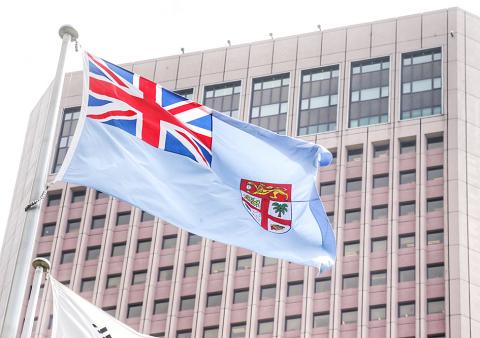Fiji has closed its representative office in Taipei to make better use of its resources and not because of pressure from China as one lawmaker has claimed, the Ministry of Foreign Affairs said yesterday.
The Fiji Trade and Tourism Representative Office was shut down on Wednesday last week after Fijian Representative to Taiwan Karaisitiani Vuibau notified the ministry of his nation’s decision to end its operations in Taiwan, ministry spokeswoman Eleanor Wang (王珮玲) said.
Despite the closure of Fiji’s office in Taipei, Taiwan’s representative office in Fiji would continue to operate, Wang said.

Photo: CNA
Fiji’s move was made to reallocate resources to better meet the nation’s needs, Wang said, adding that unofficial bilateral ties between the two nations would not be affected by the move.
The closure of the office was brought to light by Chinese Nationalist Party (KMT) Legislator Lu Hsiu-yen (盧秀燕) during a legislative committee meeting yesterday.
Lu said she learned that one of the reasons behind the closure of the office was an attempt by China — which maintains diplomatic relations with Fiji — to suppress Taiwan amid strained cross-strait relations.
However, Deputy Minister of Foreign Affairs Wu Chih-chung (吳志中) told the committee that it was believed that Fiji closed its office mainly due to its limited financial resources, forcing it to adjust the number of foreign missions it supports.
The ministry saw the closure as an isolated case that would not have a “domino effect,” Wu said.
The ministry provided administrative assistance to help Fijian officials close the office and they in turn expressed their gratitude to the ministry for its efforts to help advance bilateral ties over the years, Wang said.
Fiji set up its representative office in Taiwan in 1997, in an effort to advance trade, investment and tourism relations, after the nations signed a joint “mutual recognition” communique in 1996, the ministry said.
Taiwan set up a trade mission in Fiji in 1971, which was closed and replaced by the East Asia Trade Center in 1976, a year after China and Fiji established diplomatic ties.
The East Asia Trade Center was renamed the Trade Mission of the Republic of China (Taiwan) to the Republic of Fiji in 1988.

The Ministry of Economic Affairs has fined Taobao NT$1.2 million (US$36,912) for advertisements that exceed its approved business scope, requiring the Chinese e-commerce platform to make corrections in the first half of this year or its license may be revoked. Lawmakers have called for stricter enforcement of Chinese e-commerce platforms and measures to prevent China from laundering its goods through Taiwan in response to US President Donald Trump’s heavy tariffs on China. The Legislative Yuan’s Finance Committee met today to discuss policies to prevent China from dumping goods in Taiwan, inviting government agencies to report. Democratic Progressive Party Legislator Kuo Kuo-wen (郭國文) said

The Ministry of Economic Affairs has fined Taobao NT$1.2 million (US$36,900) for advertisements that exceeded its approved business scope and ordered the Chinese e-commerce platform to make corrections in the first half of this year or its license would be revoked. Lawmakers have called for stricter supervision of Chinese e-commerce platforms and more stringent measures to prevent China from laundering its goods through Taiwan as US President Donald Trump’s administration cracks down on origin laundering. The legislature’s Finance Committee yesterday met to discuss policies to prevent China from dumping goods in Taiwan, inviting government agencies to report on the matter. Democratic Progressive Party

Taiwan and its Pacific ally Tuvalu on Tuesday signed two accords aimed at facilitating bilateral cooperation on labor affairs, according to Taiwan’s Ministry of Foreign Affairs (MOFA). The governments inked two agreements in Taipei, witnessed by Foreign Minister Lin Chia-lung (林佳龍) and visiting Deputy Tuvaluan Prime Minister Panapasi Nelesone, MOFA said in a news release. According to MOFA, the agreements will facilitate cooperation on labor issues and allow the two sides to mutually recognize seafarers’ certificates and related training. Taiwan would also continue to collaborate with Tuvalu across various fields to promote economic prosperity as well as the well-being of their

Sung Chien-liang (宋建樑), who led efforts to recall Democratic Progressive Party (DPP) Legislator Lee Kun-cheng (李坤城), was released on bail of NT$80,000 today amid outcry over his decision to wear a Nazi armband to questioning the night before. Sung arrived at the New Taipei District Prosecutors’ Office for questioning in a recall petition forgery case last night wearing a red armband bearing a swastika, carrying a copy of Adolf Hitler’s Mein Kampf and giving a Nazi salute. Sung left the building at 1:15am without the armband and covering the book with his coat. Lee said today that this is a serious